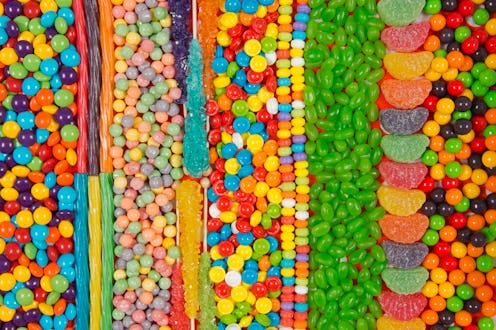Life
Why You Shouldn't Freak Out About That Study Claiming Sugar Causes Tumors

It's basically impossible to go more than 24 hours without hearing about the results of a medical study that's meant to be helpful, but only serves to fuel the raging anxiety that is in itself an epidemic. The worst part? These results of these studies tend to be inconclusive and confusing, and they're often in opposition to the results of another study that was publicized merely days before. Take, for example, this latest study from a group of Belgian researchers about findings that suggest sugar and cancer may be linked — which, considering how delicious donuts are, seems like pretty alarming news. However, you shouldn't panic. I know, I know — the not panicking thing is difficult. All of this is a constantly shifting puzzle that can leave you wondering if it's safe to eat anything, travel anywhere, or — quite frankly — leave the house. Even with my best efforts to take care of my body through nutrition and fitness, I can't help but worry that all of this contradictory medical advice really means that there's absolutely nothing I can do to ensure a long and healthy life.
First, let me bring you up to speed on the details. On Friday, Oct. 13, these Belgian researchers published the findings of their nine-year cancer and nutrition research project in the journal Nature Communications. In short, the scientists found that cancer cells seem to feed more quickly on sugar fermentation than aerobic respiration, which is the process that other, non-cancerous cells use to break down digested food. By observing yeast cells, which are similar in many ways to cancer cells that prompt tumor growth, the team concluded that dangerous tumors have a fiercer appetite for sugar than anything else. Thus, they reported that their findings suggested sugar could activate cancer genes and stimulate cancer cell reproduction at an accelerated rate, thus stimulating tumor growth at an accelerated rate.
So, yeah, it sounds scary.
"Our research reveals how the hyperactive sugar consumption of cancerous cells leads to a vicious cycle of continued stimulation of cancer development and growth," says lead study author Johan Thevelein in a press release.
Don't toss out all of your Halloween candy just yet, though. While I can respect the fact that these scientists know a lot more about molecular biology than I do (which is basically nothing), I also know that studies like this are so ubiquitous in our uber-connected world that to take every, single one as gospel would be crazy — not to mention impossible. Let's all take a deep breath, regroup, and turn to an expert for their take on all of this. For instance: Registered dietitian and nutritionist Maya Feller can't deny the fact that there have been studies in addition to this one that link "high [sugar] intake and an increased risk of some cancers," but it's anything but a simple science — and there isn't just one right answer.
"There are many studies to support and refute hypotheses," Feller tells Bustle. "It's important to remember that the development of chronic disease doesn't follow just one pathway."
We can't blame complicated diseases like cancer on a single food group or lifestyle factor, which is why findings that suggest things like "sugar feeds cancer!" may be slightly stress-inducing. No single body or case of a disease is the same, and eating a donut probably isn't going to result in a tumor.
Rather than taking cancer-fighting advice from single scientific reports, Feller recommends taking more comprehensive steps toward prevention. "Cutting out major food groups without sufficient information or reason isn't recommended," she says. "I counsel for balance." Feller also suggests that you seek health and dietary recommendations from your own doctor or nutritionist, instead of studies or findings that you see online. Of the scientific research that's made publicly available, only some is peer-reviewed and conducted with significant sample size. These variations in method, Feller says, can impact outcomes and give us needless worry.
So, don't freak out, and definitely don't swear off your favorite treats just because of one study. Candy is delicious, and chocolate is arguably even better — why would anyone want to do that?
Images: Karen M. Romanko/Photodisc/Getty Images; Giphy